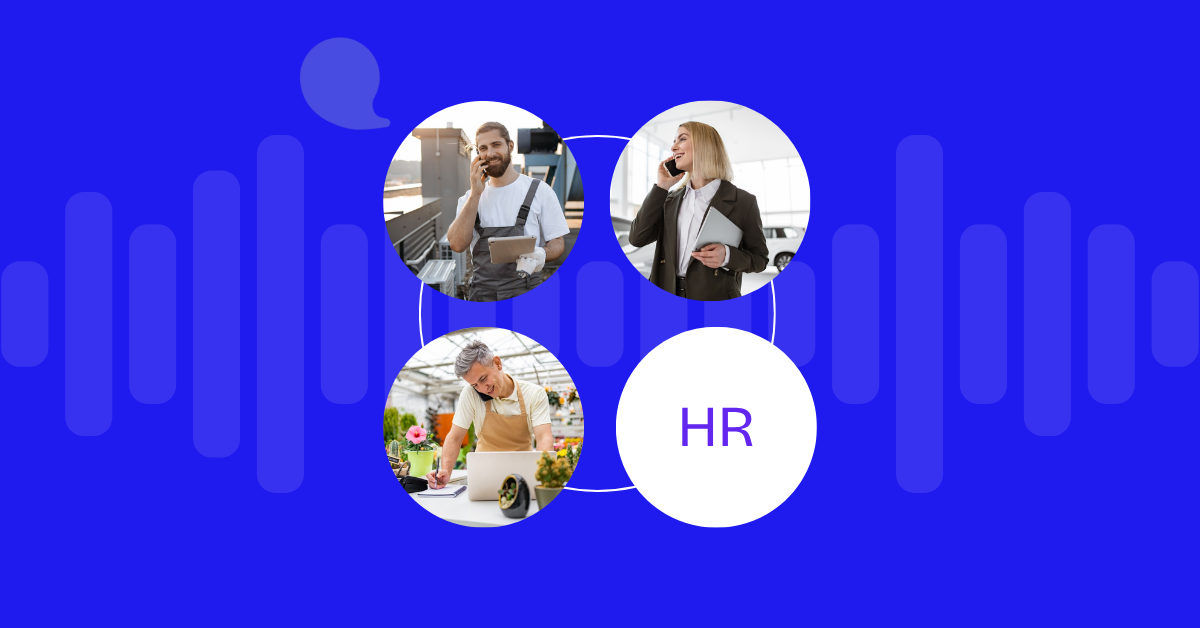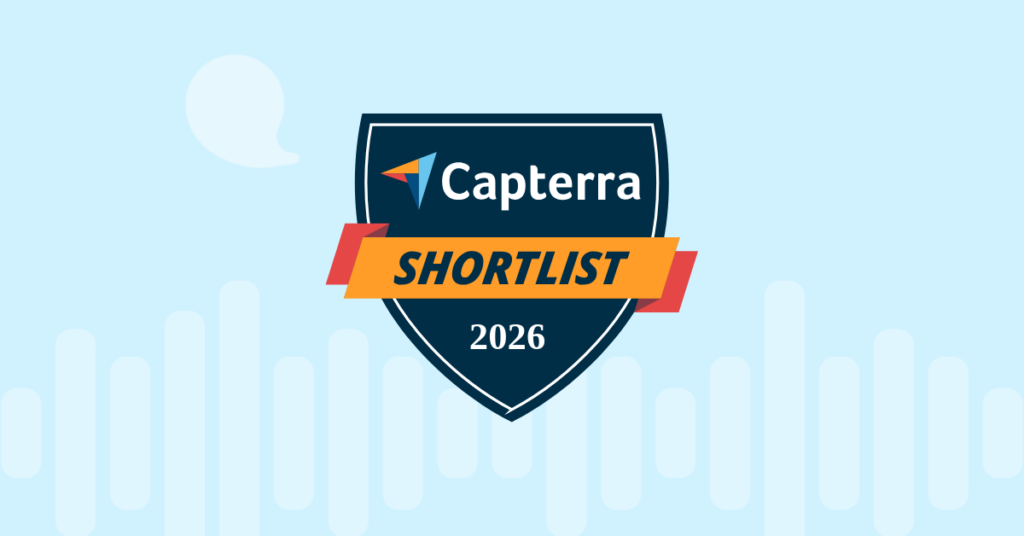
Table of contents
If you work in HR, you probably already know that your most valuable skills center around working with people and not doing manual data entry. But that doesn’t change the fact that HR software is becoming increasingly useful and popular.
From overseeing the hiring process to boosting employee engagement, HR departments often manage several processes, communicate with numerous people, and deal with a lot of forms. Needless to say, streamlining all of these tasks can save valuable time and resources.
This is where choosing the best automation platform comes in. HR automation can help you focus on more strategic work, allowing your small business to succeed long-term and focus on future growth. Let’s look at what the power of automation may look like in practice.
What is HR automation?
HR automation streamlines and optimizes various HR functions using modern digital tools. In this way, companies can significantly improve the efficiency of their HR department by utilizing platforms that automate manual tasks and processes, such as data entry, benefits administration, employee onboarding, and payroll processing.
Automation software can help reduce human error, increase compliance, enhance employee experiences, and create opportunities for data-driven decision-making. Doing this also enables the HR team to focus on more crucial areas of their role, like sourcing new talent and training and encouraging the talent they already have.
Some examples of HR automation include:
- Applicant Tracking Systems (ATS): Used to automate job postings, CV screenings, and interviewing processes.
- Self-serve tools: These guide new hires through onboarding materials, from welcome emails and account setup to orientation materials and benefits enrollment.
- Performance management tools: These automatically track employee performance metrics and help manage performance reviews.
- Time tracking software: Employees and HR managers can monitor hours, overtime, paid leave, and so on. This software can also reconcile this data from different sources so it’s clean and consistent.
- Employee survey tools: These make measuring employee engagement and satisfaction effortless for everyone.
- Communication platforms: Tools like VoIP systems power onboarding, call routing, conference calls, and training for contact center staff.
HR automation benefits small businesses
No matter your industry or size, every company should take note of modern automation trends. But how can it specifically benefit HR departments in a small business?
Streamlines recruitment processes
Automation tools enable companies to attract, engage, and select the most suitable candidates effectively and efficiently. This is invaluable in a remote world where hundreds of candidates may be applying from all over the world.
By using technology like machine learning and natural language processing, automation can help hiring managers to screen resumes, schedule interviews, and monitor candidate communication, all of which reduce administrative workload and human errors.
Automation in human resources can even enhance the recruitment process by:
- Identifying key skills and job requirements.
- Predicting candidate behavior and performance.
- Ensuring compliance with ever-changing labor laws.
- Providing a positive candidate experience with personalized communication and seamless interaction.
Improves employee onboarding
HR automation significantly improves employee onboarding by streamlining processes, reducing errors, and helping you work more efficiently.
Simplifying procedures like background checks and the collection of vital documents accelerates the onboarding process. This helps to make sure employees can settle into their roles and work productively faster than before.
Automated platforms also enable a more personalized, engaging experience for new recruits through features like:
- Virtual orientations.
- Guided training sessions.
- Automated performance tracking.
All of this contributes to employee satisfaction from their first day on the job. In the long term, this leads to a more positive workplace with increased employee retention.
Manages time and attendance tracking
Time management is vital for small businesses. Implementing automation technology like time recording software can transform your productivity, helping you manage employee schedules and reach your deadlines.
Such software utilizes data to its full potential, allowing everyone on your team to track project timelines, identify areas where you’re overworking, and delegate tasks to team members with more flexibility.
Moreover, managers can use data to gain a real-time view of employee attendance, leave requests, and team availability. With this information, you can adjust deadlines or move employees between projects as needed.
This not only reduces errors but also helps you understand employee work patterns and overall productivity. Enabling you to make learn and make improvements where necessary.
Simplifies performance management
With dedicated automation systems, you can streamline and simplify performance management tasks like goal-setting, tracking employee progress, and providing timely feedback.
Rather than spending time manually compiling data, you have more time to analyze it, allowing you to focus on managing and developing employees. An automated, data-backed process also gives you the foundation for a fair and consistent approach to employee management.
Enhances employee self-service
In today’s modern work culture, it’s essential that employees have the freedom and flexibility to manage and access relevant information.
Implementing tools like HR payroll software empowers employees by giving them instant access to vital data, such as leave balances, payslips, and benefits information. Such software improves the employee experience, fostering transparency and trust in your workplace by letting employees access and verify their own records.
With the adoption of payroll software, employees can easily request time off, update personal details, access company support services, and even track their professional development. Making these processes “self-serve” gives employees a feeling of ownership and autonomy, which is highly beneficial for boosting employee satisfaction.
Aids in compliance and reporting
Automation tools help with compliance and reporting within organizations. There’s no room for human error here, and by replacing manual processes, you can remove data inconsistencies that may lead to non-compliance.
Moreover, automation software collects data in real-time, so you can regularly check that you’re compliant, helping you stay ahead of changing legislation. By keeping all data in one place, compliance software can generate the required documentation and forms you need on-demand, making compliance less of a headache.
HR automation strategies
Now that we know what intelligent automation can do, how can you go about implementing it?
Research HR automation solutions
To start, search for reputable online sources such as HR technology blogs, industry reports, and reviews to gather information on automation trends, popular vendors, and appropriate solutions. Look at HR forums or LinkedIn groups to ask people with firsthand experience about how they use these systems and the key benefits.
If you have your eye on a solution, see if the provider offers educational resources like ebooks and webinars. These give you a glimpse into the product and company before you make a purchase.
Once you know what you’re looking for and have warmed up to a solution, get in touch with the sales team, and don’t be afraid to ask questions about required features and support.
Start with core processes
When you’re implementing HR automation, it’s important to begin with the most crucial processes.
This includes:
- Talent search, CV screening, and interviewing.
- Employee onboarding.
- Payroll management.
- Performance and productivity management.
- Learning and development.
- Employee offboarding.
By automating these routine and administrative tasks, you can significantly reduce time spent on repetitive, manual work and move on to more strategic projects.
Rather than just allowing you to stay on top of the work you’re already doing, this will proactively improve the way your company operates.
Customize automation workflows
Everyone wants to work faster and more consistently. But the automation process isn’t a one-size-fits-all solution.
When setting up HR automation, it’s essential to customize automation workflows to your team’s specific needs, creating a seamless experience for both employees and management.
Allow teams’ problems to lead the solution. For example, your customer support team might be doing a good job on their own but need help communicating with other teams. In this case, consider integrating a VoIP solution with your other software to share information between departments.
That way, the sales team can view support notes in their CRM. By getting your teams working together more frequently, you’ll increase employee engagement and give people more pathways to development.
Train HR staff and employees
HR automation software is a worthwhile investment, but you must make sure your teams are getting the use out of it. That means dedicating time and resources to training HR staff and “end-user” employees.
This is crucial for ensuring that the automated processes run smoothly within the organization. By properly training HR staff, they will better understand the nuances of the software and its capabilities, allowing them to troubleshoot any issues that might arise.
Remember to give employees clear instructions or tutorials for using the new platform and services so they can more easily adapt to using the new processes. This will also get buy-in from employees who might be used to working the old way.
Finally, secure a strong line of communication between HR and other teams, so employees can quickly raise issues with the new systems.
Monitor and optimize performance
Successfully implementing automation tools is an ongoing process. You need to continue to monitor and optimize your new system, to make sure you’re getting the results you want.
As with many business projects, you can do this by tracking KPIs, which can include the following:
- Employee turnover
- Employee satisfaction
- Customer satisfaction
- Time to hire
- Number of employees staying after one year
HR automation for small businesses
Automation is a growing trend that’s here to stay. In small businesses, HR automation solutions can boost productivity, guarantee you stay compliant, and improve the employee experience for both existing staff and new hires.
HR teams that can successfully implement automation with the right customization and training will reap the benefits, enabling growth and future-proof systems.
VoIP can integrate with HR solutions
VoIP cloud communication solutions can integrate with HR solutions to boost the productivity of HR departments in the following ways:
Streamlined Communication: By integrating VoIP cloud communication solutions with HR systems, HR professionals can have seamless communication channels for various HR tasks such as candidate interviews, employee onboarding, and internal employee communication. This integration eliminates the need for switching between different platforms, saving time and increasing efficiency.
Automation of HR Processes: VoIP cloud communication solutions can be integrated with HR systems to automate routine HR processes. For example, automated call routing can direct calls to the appropriate HR personnel based on the nature of the inquiry or automate follow-up communication with candidates. This reduces manual effort, minimizes errors, and accelerates HR operations.
Unified Communication Channels: Integration allows HR professionals to access communication tools, such as voice calls, video conferencing, and instant messaging, from within their HR solutions. This unified communication environment improves collaboration among HR team members, enabling quick decision-making, problem-solving, and efficient coordination of tasks.
Mobile Accessibility: VoIP cloud communication solutions provide mobile applications that allow HR professionals to stay connected and access HR-related communication on the go. This flexibility ensures that HR personnel can address urgent matters promptly, regardless of their location, enhancing responsiveness and productivity.
Data Synchronization: Integration between VoIP cloud communication and HR solutions enables the synchronization of employee data. When a call is made or received, relevant employee information can be displayed, providing HR professionals with immediate context and facilitating better communication and personalized interactions.
Enhanced Analytics and Reporting: Integrating VoIP cloud communication with HR solutions enables the collection and analysis of communication data, such as call duration, call volume, and response times. This data can be used to generate insightful reports, identify trends, and make data-driven decisions to optimize HR processes and improve overall productivity.
If you want to know more about how to integrate VoIP with HR solutions, please contact VoIPstudio.
More from the blog
Want to improve your business communication?
Unlock enterprise-class call center power at affordable prices – no hardware, no delays, no surprises!










